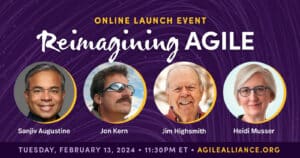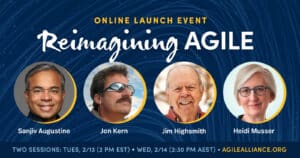Dr. Dave:
Hello, and welcome to the KnolShare with Doctor Dave Podcast. This is Doctor Dave Cornelius, your host. Give me an elevator pitch, one minute or so about what makes Tim, Tim?
Tim Abbott:
Well, what makes me, me is that I’ve been working in the Agile space for quite a long time. I’m just passionate about helping teams and helping organizations. I started off as a software engineer developer, and then I moved up pretty quickly because one of the things that was naturally innate in me was the ability to connect with people and the people side of the business. While technically, I was very strong, it was one of the things that stood out, so I immediately started working with teams and leading teams. I would say probably the thing that makes me, me and the thing I’m most passionate about is helping people connect to reach a common goal. That’s basically my background and what I’ve been doing for the past, I guess now it’s been almost 25 years.
Dr. Dave:
That’s wonderful. Let’s talk about social justice. One of the definition that look at for social justice is about fair and compassionate distribution of wealth, opportunities, and privileges within a society. We’re talking about equal rights and equitable opportunities for all. How does social justice show up for you where you live in your country? Matter of fact, where do you live?
Tim Abbott:
Well, I mean, I’m from the States. Well, I don’t know if that’s obvious, but I’m from the States. My father was in the oil business initially. I was raised between Texas and Oklahoma. I don’t really say I’m from somewhere, because I was living in West Texas, and Houston, and lived between Oklahoma City and Tulsa. That’s where I grew up. And then, I became a software engineer, I went to college, I became a software engineer. And in college, it’s funny you mentioned social justice, because in college, that was really, I was deeply involved in a lot of social justice and just, where I’m living now, I live in Saudi Arabia now, I’ve been here for 14 years, it’s funny you ask, because one of the things that brought to Saudi was, I just got tired of … I was pitching a startup that I was running when I finally left the States, and I never could break that glass ceiling, or get the opportunity when we were generating quite a bit of revenue. But funding, I was in Atlanta at the time, and funding, at that time, for people that look like me because I didn’t match a particular pattern, was difficult to come by.
Tim Abbott:
So, I just said, “Forget it,” and ended up with a project that I thought I was going to be on for a year in Saudi Arabia, and then, just many different opportunities started opening up for me while I was here, as I was running the company here. We expanded and expanded, and then, finally, we ended up selling that company in 2015. The company expanded quite a bit and we sold it here locally to some investors in 2015.
Tim Abbott:
But how it shows up to me is just the opportunities. People want a chance, right? People want a real chance to be able to prove that they can perform, and for me, that’s all that I ask for, that people are given a chance. That’s why the majority of my work is about helping people become the best that they can be, and giving them chances to show who they are and what they can do. That’s how it shows up for me.
Dr. Dave:
That’s wonderful. So, in terms of some of your own personal social justice experiences, what were they that challenged you to want you to bring about change?
Tim Abbott:
I grew up in, I wouldn’t say privilege, but my parents did fairly well and I ended up going to an HBCU for undergraduate. I majored in physics and had an academic scholarship and an athletic scholarship. I played tennis all growing up, and I played tennis in college as well. One of the things that I immediately saw when I went to the HBCU was the dearth of resources, that my high school had, in some cases, greater access to resources. That was quite puzzling. I grew up in, I would say a bit of a bubble. I never went to a predominately minority or African-American school before, and then when I went to the University and I saw this gaping hole in resources and opportunities where I found some incredible people, I found some absolutely incredible and talented people, that’s where I just said, “Something’s wrong. There’s really a problem.” So, I did a lot of soul searching, a lot of digging, and looked at ways in which I could try to help and contribute. I was a mentor to a lot of kids coming up, because I was strong in math and science. I did a lot of tutoring at local high schools, and practically looking at ways in which we could alter the trajectory of people that have talent but don’t have opportunities.
Tim Abbott:
For me, that was really critical and a great experience, and I wouldn’t change it for the world.
Dr. Dave:
Which HBCU did you attend?
Tim Abbott:
I went to Alabama A&M.
Dr. Dave:
Okay. All right. When we talk about recently, well, it’s a year ago now. Today is the anniversary, which is really cool that we’re having this conversation about George Floyd, the murder of George Floyd in the United States kind of sparked this outcry for social justice in the world. I just wanted to tap in to see how did that tragedy really affect your thinking about the need for social justice changes?
Tim Abbott:
Practically, I don’t think it changed much. Fortunately or unfortunately, it didn’t change my desire or feel there was a need, because I’ve always felt it. I’ve been in those rooms. Like I said, I’ve been meeting with various people, I’ve been inside of the communities, I’ve worked inside of the communities. Speaking of when I graduated from college, I was living in Houston. I was working at NASA, which is in Clear Lake, which was just in South Houston, the South of Houston, but I was living, for all intents and purposes, in the “hood”, because I was very involved in programs for helping out people inside the community. I’ve always, even though I could live in many different places, I’ve always been close to the epicenter of problems, because I’ve felt that it was critical that I understood the problems. For me, unfortunately, there was no change. I mean, to be perfectly honest. What it did though, the colleagues that speak to me, whether in the Agile community or just colleagues in general that I’ve kept in touch with over the years through LinkedIn and talking back and forth on social media, so on and so forth, they were more impacted by it because they just had no idea, because you’re only a product of your environment, practically.
Tim Abbott:
Since it was so egregious and that really had them reaching out to me and looking at ways in which they could make a change. And I would be remiss if I didn’t mention that, because really, they did. I mean, a lot of them, various CEOs that I worked with in the past in the States, and numerous people reached out asking, “What can we do? What can we do? What can we do?”
Dr. Dave:
That’s interesting. If we look deep into the Agile community, and I want to say as an Agile practitioner, where do you feel you have the most opportunity to effect change for social justice changes, especially in the work that you do?
Tim Abbott:
Empathy, for me, is critical. We’re working in a human system, and that human system requires us to look at the various people around us as having the same desires and needs that we have. Teaching and coaching empathy, for me, is critical to helping people understand others and their differences. To be perfectly honest, one of the things that I always hated, people used to always tell me, “Well, I don’t see color.” That, for me, was just really problematic. Or, “I don’t see difference.” Well, that’s really problematic, because I personally don’t want you not to see a difference. There are differences, and those differences are the spice of life, and that’s what creates beauty in the world. Those differences, and helping people understand that they need to be able to see and appreciate diversity of thought, diversity of perspective, diversity of experience, to me, is getting people to have empathy with one another, and then looking at a common goal.
Tim Abbott:
If you have diversity of experience and you’re looking at a common goal, and people come up with different … We all do stand-ups, and meetings, and planning, and so on and so forth, and everyone’s ideas are being thrown up against the wall and being challenged, and listened to and challenged, looking for what is the right thing to do towards a particular common goal? Well, that diversity of experience, and that diversity of background, and that diversity of thought brings up myriads of ideas and really some amazing things. Where I first saw this was actually, to be perfectly honest, was pre-Agile, or the Agile craze, is I was working at an agency. It’s called VMLY&R. It’s one of the top, now, agencies in the world. One of the CEOs of this agency reached out to me. But what I found there was all of those different perspectives, people working in teams. We would do business for Microsoft, for Adidas, and that diversity, when people came from different perspectives, the ideas we came up with were phenomenal. To me, that’s what’s critical, teaching empathy and then helping people understand the benefits of diversity of perspective, as long as we have the same common goal.
Dr. Dave:
That’s excellent that you brought up the conversation around the need for people to see that there are differences and to try and put blinders on and say that they don’t see color, it’s really a tough one for me, too, for people when they say that. Really challenging.
Dr. Dave:
Let’s talk about you, a few actions that you’re taking personally to improve opportunities for people affected by social justice challenges in the Agile community. Wherever you are. You’re in Saudi Arabia, so even in that space. What does that look like? What are you doing about that?
Tim Abbott:
Not so much in Saudi, to be perfectly honest, but I travel. One of the benefits of being here, which is one of the many, many benefits. When I was in the States, everything seemed so far away, but since I’ve been here, I go to West, and East, and North and South Africa quite a bit. I go to Asia quite a bit. I like to go to places, because of, I guess my social justice roots, to places where people don’t generally look as advanced. One of the programs that one of my good friends from Zimbabwe, he lives in the U.K., so we started was to teach African youth how to make $2,000 a month online. We ran a cohort that went exceptionally well, where we do some digital marketing courses where we do that online, and then we take them through the process of generating revenue online. Not all of them, to be perfectly honest, reached $2,000, but we had some that went over. We had people that were under, but it was phenomenal, because these are people living on much less.
Tim Abbott:
These are the type of things that I do. I’ve worked with a number of governments, not only here locally, but also in West Africa specifically, and looking at ways in which we could bring programs to bring skill development and team development. You know, as a coach and a trainer, that practically, we can’t do much alone. There is this African proverb that, if you want to go fast, go it alone. If you want to go far, go together. I don’t know if it’s really an African proverb, but that’s what they say. Practically, you know in business when you have one person, you can be a superhero, but it’s not scalable. One of the things that’s really critical to me is that, how to create scalable opportunities in places that don’t have as many opportunities? And if I was to come home, I would do the same thing. If I come home now or later, that’s what I’m committed to, because, to me, that’s what I’ve been about.
Dr. Dave:
Excellent. So, if we wanted to be more futuristic and we want to think about what would the diversity, equity, inclusion, and belonging utopia look like for you?
Tim Abbott:
Oh. Honestly, having been in these places and having been in the communities I’ve been in in the States, it would be opportunity and fairness. A lot of people talk about opportunity and being equitable, and fairness, and so on and so forth, but it’s a bit difficult when you see it on the ground where people’s natural resources are practically being taken from them at alarming rates without practically giving them value on the natural resources that they should have. One of the problems I have, having seen these places up close and personal, let’s take two dichotomies. There’s the U.S. Inside of the overall political and school systems, and so on and so forth, and communities where obviously tax dollars fund various educational opportunities, it’s just not equitable. It just really isn’t. When you’re starting from behind, it’s a bit difficult, because when we do programs too late, there’s not a lot of things that you can … The opportunities to make change are less, versus if we do things earlier. To me, the fairness and equitable distribution of opportunity, and not creating barriers within the society that are going to prevent those people from achieving.
Tim Abbott:
And then, when I look at, in some of these countries I’ve gone to, it’s the same thing. People are taking from these places, but not really giving fair prices for their natural resources. To me, it would be fairness in being equitable across the board. That’s in every place across the world.
Dr. Dave:
That’s excellent. Any final thoughts as we wrap up our conversation about-
Tim Abbott:
I appreciate you and the various people in the Agile community for taking this on. It’s really a tough subject and I appreciate people looking at what happened, because George Floyd, believe it or not, people were talking about it here.
Dr. Dave:
Yeah, yeah.
Tim Abbott:
It’s been a flash point. My final thought would be not to let one event define our activism. We can be an activist, and then people will get fatigue and then not do the real work necessary at all levels, whether it’s with their colleagues or the programs that need to be done at higher levels in the programs, and volunteering that you’re doing for example, in your foundation. We cannot develop fatigue. And just because we don’t have a video camera of something appalling, no longer can people sit around and say these things don’t exist. I think, for me, that’s my final message. And once again, I appreciate you and Agile Alliance, and everyone in the Agile community, and those people that have been reaching out. I really appreciate it.
Dr. Dave:
Tim, just thank you so much for the insights and the fact that we have the level of resiliency to continue forward, because that’s what you’re asking for. Thank you so much for your time tonight. This is really great. I’m reaching across the world, having conversations with people across the world about what’s going on with social justice in their space, in their environment. It’s just important to have different voices as we walk through, and it’s been almost a year now, and we’ll journey for another six months or so, but it’s really important to have these conversations, so thank you for taking the time, for contributing to this conversation.
Tim Abbott:
Absolutely. Anytime.
Dr. Dave:
Yeah. Thank you for listening to the KnolShare with Doctor Dave Podcast. I hope this learning experience would also prompt you to take and seek more, and discover how you could contribute to positive experiences for BIPOC lives. I said it really doesn’t take much. All you need to do is to tap into your own humanity. Until next time, be well, stay safe, and connect soon.





